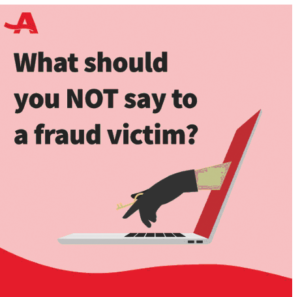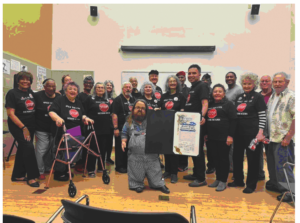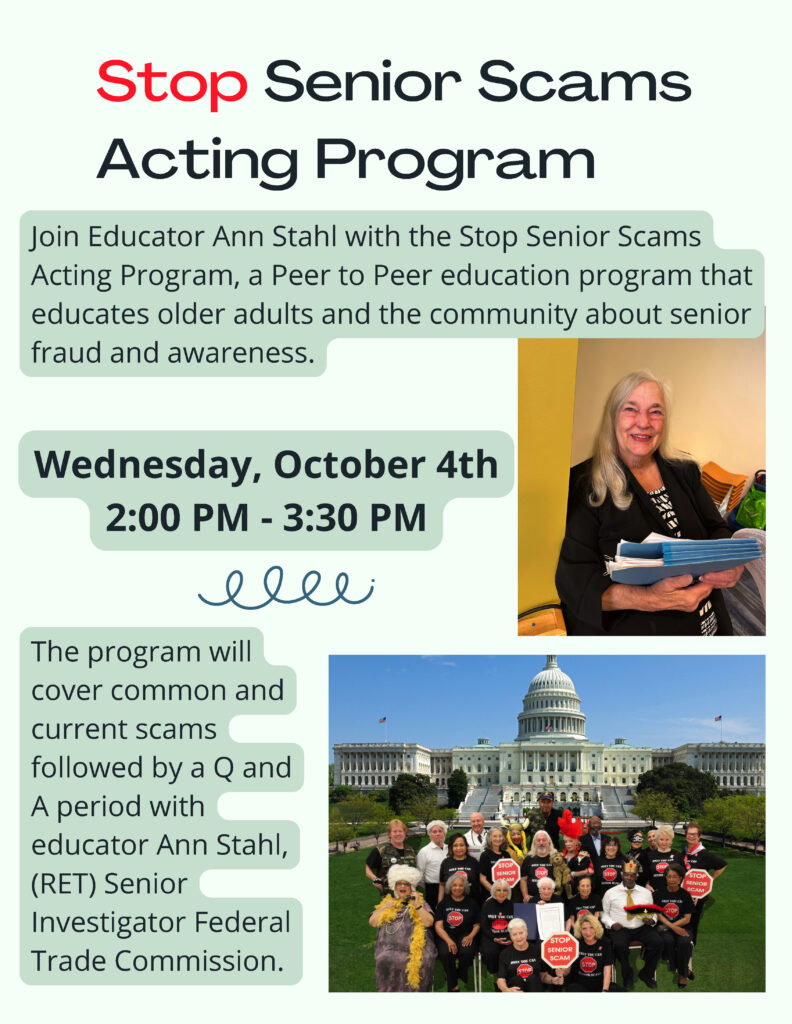29 Sep UPDATE — WHY WE ‘BLAME THE VICTIM’

Dr. Sherry McCoy PhD
is a freelance writer & actor for the Stop Senior Scams Acting Program (SSSAP) in Los Angeles. Follow SSSAP on Facebook . For more info re: SSSAP, contact Adrienne Omansky at SSSAP4U@gmail.com. Questions for the writer should be directed to “Dear Sherry” at Not Born Yesterday! P.O. Box 722, Brea, CA 92822 or nbynews@juno.com.
UPDATE — WHY WE ‘BLAME THE VICTIM’
Dr. Sherry McCoy, PhD – Stop Senior Scams ℠ Acting Program
It’s October of 2023 — Halloween is on the horizon! It’s a time when ‘trick or treaters’ will be out and about looking for candy corn and other yummy sweets. Some of those ‘trick or treaters’, however, will be scammers. They aren’t looking for candy corn! They’re looking to steal your money, perhaps, your life savings. Being aware of how scammers operate is certainly helpful in preventing fraud, but it is equally important to remember that scammers target everyone, and that anyone can be a victim of fraud. It doesn’t matter how smart you are (or think you are), or what kind of education you have. We are all targets. Any one of us could become a victim of fraud.
This begs the question – ‘Why do we tend to ‘blame the victim?’ Specifically, why is there this tendency to blame victims of fraud for having fallen prey to scammers lies and fraudulent schemes, saying hurtful things like, “You should have known better,” or “How could you have been so stupid?” Why don’t we, instead, blame the scammers themselves, the predators who are perpetrating this criminal activity? And why don’t we spend more of our precious time and energy in supporting victims of fraud, encouraging them to report scams to appropriate authorities? In short, why don’t we treat the victims of fraud like a friend who has been injured and needs some help and understanding?
Last year in this column, we took a look at how the all-too-often practice of ‘scam shaming’ fraud victims is the psychological kingpin that keeps fraud victims quiet and robs them of their voice. It keeps them from reporting crimes and thus helps keep fraudsters in business. If you think about it, when we ‘scam shame’ someone who has been victimized by a fraudster, we are actually choosing to side with the criminals. When scams aren’t reported, laws designed to protect us from fraud can’t be enforced. Scammers go free and justice is thwarted. This is not a pretty picture. — So, let’s review how we can change our collective behavior. Let’s examine how we can stop the tendency to side with scammers and instead become better allies of fraud victims.
THEORIES ON ‘WHY WE BLAME THE VICTIM’
HINDSIGHT BIAS
Hindsight is always 20/20. It allows us in the now to see clearly what we were not able to see in the past. Hindsight sheds new light on past events. But when we use our 20/20 hindsight to judge what we think someone else should have known, done, or seen when something awful happened to them – like getting ripped off – we are in effect, blaming the victim. At the time of the fraudulent attack, the scam victim did not have the advantage of hindsight vision.
THE JUST WORLD HYPOTHESIS
Many of us tend to persist in believing that the world is a fair place, often in the face of overwhelming evidence that it is not. We want to believe that the world is fair and that therefore, people get what they deserve. Good is rewarded and evil is punished. We don’t want to think that sometimes bad things happen to good people. Because if we recognize that sometimes bad things do happen to good people, then we come face to face with the awareness that bad things could happen to anyone, even someone like you or me. Ergo, anyone could be the victim of fraud – regardless of how much money they make, or even if they appear to be someone who does everything “right.” So, to protect ourselves from the reality that the world is not fair and to maintain the illusion that it is fair, we distance ourselves from victims of fraud. We blame them for their misfortune.
ATTRIBUTION ERROR / BIAS
Another way we sometimes blame the victim is through what is called ‘Attribution Error or Bias.” This occurs when we point an accusatory finger toward internal, personal characteristics as the cause for someone else’s problem, e.g., as an explanation for why they were a fraud victim, while – at the same time – conveniently ignoring any external, outside forces that may have also contributed.
SO, WHAT’S THE SOLUTION?
First, we need to remember that making changes is a process. It’s not going to happen overnight. But a good place to begin is with self-examination, empathy, and awareness. These are key factors in moving away from the habit of blaming the victim. We can take the time to look inside and begin to notice our thought patterns and have the courage and the will to change those patterns if we don’t like what we see. We can develop greater empathy for others by imagining what it would be like to walk a mile in their shoes. We can continue to educate ourselves by reading articles and watching videos that address the issues involved in blaming the victim (see suggested REFERENCES below). We can encourage fraud victims to speak out about fraud, to report scams to the appropriate authorities, to join support groups if needed so they can heal. In short, we can learn to be a better friend of fraud victims — if we choose to do so. Where there is a will, there will always be a way.
If you’d like to share a personal scam story or have any questions or thoughts about scams that target seniors, please feel free to write to me at “Dear Sherry” at Not Born Yesterday! P.O. Box 722, Brea, CA 92822 or nbynews@juno.com. I’d love to hear from you. Thanks!
Be Empowered. Find Your Voice. Speak Out About Fraud!
WHERE TO REPORT SCAMS
Federal Trade Commission at 877-382-4357 or online at https://www.ftccomplaintassistant.gov/#crnt&panel1-1.
For questions about Medicare fraud / abuse, contact Senior Medicare Patrol (SMP*) at 1-855-613-7080.
U.S. Senate Special Committee on Aging’s Fraud Hotline at 1-855-303-9470.
REFERENCES

Sign up for this free online course (6:44 minutes video) — “In Scams, It’s not the victim’s fault,” at https://elearn.aarp.org
Wilson LPC ACS, Cathy. The Emotional Impact of Being Scammed and How to Recover. LifePaths PLLC. Kindle Edition.
http://www.fraudaid.com/library/articles/12_steps.htm — “Coping With The Aftermath Of A Fraud: 12 steps to getting your life back on track,” by Annie McGuire, fraud victim, Fraud Victim Advocate, Founder – Fraud Aid, Inc.
Why do we Victim Blame, Ellie Rowe, January 2020.
https://www.verywellmind.com/why-do-people-blame-the-victim-2795911 – Why Do People Blame The Victim, Kendra Cherry, July 23, 2020.
https://www.theatlantic.com/science/archive/2016/10/the-psychology-of-victim-blaming/502661/ — The Psychology of Victim Blaming, Kayleigh Roberts, October 5, 2016.
https://www.theguardian.com/us-news/2018/feb/27/victim-blaming-science-behind-psychology-research – Why We’re Psychologically Hardwired to Blame the Victim, Maia Szalavitz, February 27, 2018.
RECENT SSSAP EVENTS

Caption: SSSAP cast, along with Eugene Owens, Librarian at Exposition Park Los Angeles Regional Library, and Anthony Montiel, Director of Claude Pepper Senior Center, pose with the LA City Council Resolution making May 15th, 2023, Senior Fraud Awareness Day.
SAVE THE DATES!
On Wednesday, October 4th, SSSAP will bring its education program to the Culver City Senior Center.

On Wednesday, November 15th, from 11am – 12:30pm, SSSAP will be presenting its education program at the Palisades Branch Library, 310-459-2754, 861 Alma Real, Pacific Palisades, CA 90272
Dr. Sherry McCoy, PhD is a freelance writer & actor for the Stop Senior Scams ℠ Acting Program (SSSAP) in Los Angeles. Follow SSSAP on Facebook at https://www.facebook.com/SSSAP2016/?fref=ts. For more info re: SSSAP, contact Adrienne Omansky at SSSAP4U@gmail.com. Questions for the writer should be directed to “Dear Sherry” at Not Born Yesterday! P.O. Box 722, Brea, CA 92822 or nbynews@juno.com.




Sorry, the comment form is closed at this time.